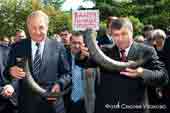You can’t fool us, world says
By David Matsaberidze
Friday, September 19

While Russia tries to bargain with the EU over the six point ceasefire agreement, the EU accuses Russia of introducing amendments to the document it signed. The US Senate is denouncing the Russian aggression and expressing its continued firm support for the territorial integrity of Georgia. Russian occupation forces keep strengthening their positions in various regions of Georgia, apparently not ready to vacate them in the foreseeable future, despite Russia having committed itself to doing this. Meanwhile the Parliament of Georgia is preparing a new statement concerning the Russian aggression and occupation of Georgia.
The reluctance of the Russian side to accede to the terms of the agreements it signed is demonstrated by its continued military presence in various regions of Georgia, a violation of any accord. Russian forces have been redeployed in the village of Perevi, in the Sachkhere Region, bolstering their illegal checkpoints all across the Sackkhere-Gomi highway. They have also constructed fortifications. Five other villages in Samegrelo are still occupied, along with Chkorotsku and Kanti. The 31th Battalion of the Russian 43th Army is now stationed in the region, while Abkhazian separatists have erected prefabricated checkpoints. As Zurab Tsertsvadze, the Governor of Sachkhere Region, stated, “The academic year should begin on Monday, but the municipality is unable to deliver equipment to the schools in the region.”
OSCE High Commissioner for National Minorities Knut Vollebaek has attended a special meeting in Zugdidi. Before the meeting Vollebaek visited Sokhumi, although he was unable to visit the occupied villages. The High Commissioner expressed his concerns over the signs of military buildup in the separatist region. He emphasized that “a mass delivery of Russian passports is being planned and Georgian-language teaching in the secondary schools will be prohibited.”
The position of the US on the recent developments in Georgian-Russian relations was expressed by US Deputy Assistant Secretary Matthew Bryza at a press conference in Tbilisi on September 17. Bryza said that “the war was a well-planned provocation by Moscow,” and pointed to the various terrorist acts and bombardment of the Georgian villages of the region by Ossetian irregular formations, with the heavy support of Russian peacekeepers, prior to Georgia’s attempt to restore constitutional order. Bryza also dismissed Russian allegations of genocide of the Ossetian people as groundless, referring to Human Rights Watch testimonials and an independent investigation conducted by the New York Times, both of which asserted the opposite.
In the USA itself, “The US position remains unchanged with respect to the territorial integrity and sovereignty of Georgia”, Spokesman for the White House National Security Council Gordon Johndroe stated. “We firmly retain our position and hope that Russia will fulfill her obligations as set out in the ceasefire agreement,” he stressed. The US Senate Foreign Relations Committee, led by Democratic Vice Presidential Candidate Joe Biden, has dedicated a special session to discussion of the Russian aggression. The Russian Federation was heavily criticized, although the Committee said that both sides had made mistakes. The Committee declared that the Russian Federation had adopted aggressive and provocative policies towards Georgia for several years and the US would not allow Russia to use Soviet methods. Meanwhile, Senator Dan Lugar once again raised the issue of granting a MAP to Georgia.
Rumours have spread that a special meeting is being planned between the US and Russian Presidents concerning Georgia, based on a statement made by the US Ambassador to the Russian Federation, but the White House has denied this. Dana Perino, the White House Press Secretary, stated that “she doubts whether the President of the Russian Federation will deliver his speech at the UN Assembly next week.”
Another round of criticism of official Tbilisi was launched by Russian Minister of Foreign Affairs during his annual address to the Federation Council. Sergey Lavrov, condemned Georgia for violating the six point agreement. Lavrov stated that Russian forces will leave the buffer zones as soon as international monitors are placed there, although he stressed that “Georgia is trying to rid itself of its responsibilities under the Sarkozy document.”
Lavrov later accused the UN and EU of assisting official Tbilisi to make amendments in the Sarkozy document which favour it. “The main aim of the Russian Federation is to ensure security in the Caucasus, therefore the agreement between the President of the Russian Federation and his French counterpart should be looked upon as a means of facilitating this. It is the result of successful diplomacy and mediation.” Lavrov added that the special session of the Federation Council had discussed “The international situation in the context of Georgian-South Ossetian and Georgian-Abkhazian relations” and “the role of the Russian Federation in the regulation of regional conflicts and other world crises.” Lavrov particularly stressed the “ambiguity” of the Georgian position, where on the one hand it promises not to use force in Abkhazia and South Ossetia and on the other it claims that these two republics are integral parts of Georgia.
Russia is also expecting alterations in its relations with NATO. A special report on this issue will be presented to Moscow by the Permanent Representative of the Russian Federation to NATO Dmitry Rogozin. As he departed for the Russian capital he stated, “I am travelling to Moscow to inform the Minister of Foreign Affairs, the Defence Minister, as well as representatives of the President’s Administration of possible changes in NATO’s attitude towards Moscow,” Rogozin said.
The Parliament of Georgia has begun to prepare a new report concerning the Russian occupation, in order to clarify once again who started the war. Testimonials are being collected by the Parliamentary Committee for the Restoration of Territorial Integrity. The developments since January 2008 and Russian actions prior to the war are outlined in some detail. The head of the Committee, Shota Malashkhia, will send the report to international organizations.
